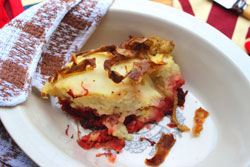from The Guernsey Literary Potato Peel Pie Society

There was very little butter, less flour and no sugar to spare on Guernsey during the German occupation of the Channel Islands in WW2. The occupation lasted for 5 years from June 1940 - May 1945. In fact, the English Channel itself was heavily guarded. Some say Hitler saw it as his stepping stone to seizing mainland Britain, others that his obsession with the Channel Isles led to his eventually losing the war as he spent so many of his resources on them.
The book, by Mary Ann Shaffer and Annie Barrows is fiction but based around accounts from real-life survivors who endured terrible conditions and desperate hardship during the occupation.
The pie (p 46 in the current paperback version) was described as: made from mashed potatoes for the filling with boiled beetroot for sweetness and potato peelings for crust.
There are no further instructions and the one in the film made by Tom Courtney’s character, does look a bit vile to be honest!
I had a bit of a think as to how to make it as appetising as possible, and here it is.
Peel around 750g (1½lb) of well-scrubbed potatoes.
Bake the peelings on a lightly greased baking tray until just beginning to twist and firm.
Boil the potatoes and mash them with salt and pepper.
Using the fine side of a box grater, grate one smallish to medium boiled beetroot (a vacuum packed one works well) into the bottom of a greased pie dish.
For a very much more delicious post-war version add butter to the mash: it makes a world of difference.
Spread the mashed potato over beetroot and scatter the baked peelings over the top, pressing them lightly into the mash.
Bake for 20-25 minutes.
Incidentally . . . .
This is another recipe that featured in the well-being day ‘Cooking in the Spirit of Remembrance’ for Salisbury Diocese. We made one pie without butter and an identical one with butter and had a taste test. The one without tastes absolutely fine but unsurprisingly the butter one was so much better. How the people of Guernsey must have longed for a bit of butter, or indeed, a bit of anything, during those long difficult years.